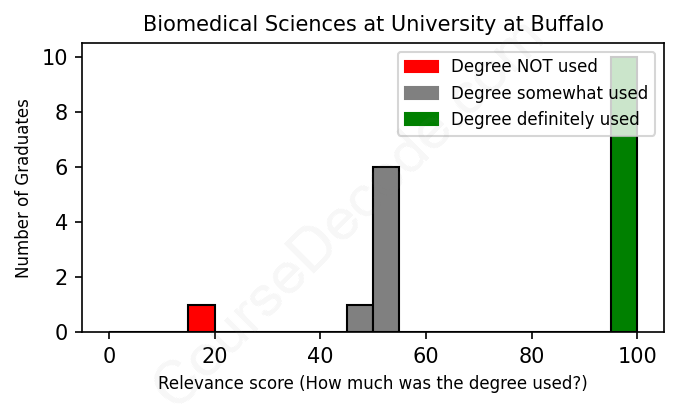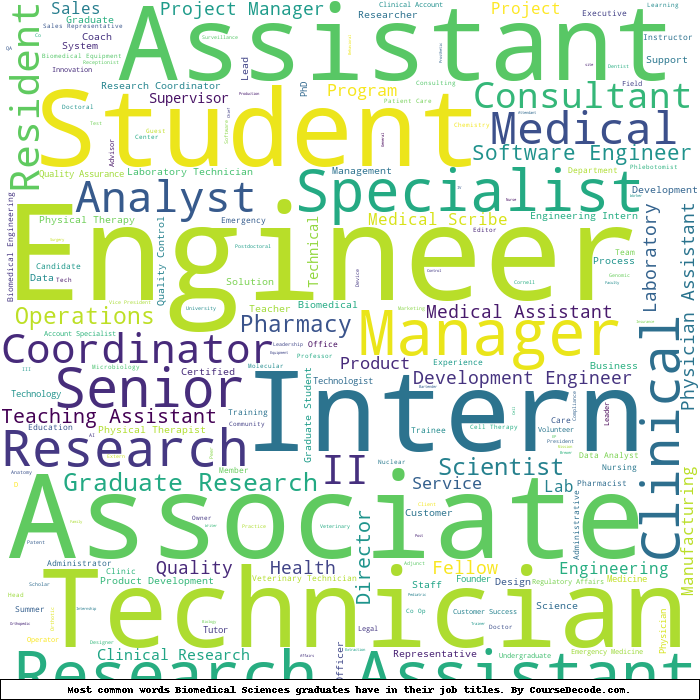
First, some facts. Of the Biomedical Sciences graduates from University at Buffalo we've analyzed , here's how many have used (or NOT used) their degree in their career:

These are estimates based on AI analysis of 18 LinkedIn profiles (see below).
The verdict? Above average. Overall, with an average relevance score of 75%, Biomedical Sciences graduates from University at Buffalo have a higher likelihood (+8%) of finding work in this field compared to the average graduate across all fields:
And for comparison, here's the chart for all profiles we've looked at across all degrees.
Also, after graduating, 50% of these graduates have pursued further education other than another Bachelor's degree (such as a Masters degree or other), compared to the average across all profiles of 35%. This suggests you may need more than just a Bachelors degree to be competitive as a Biomedical Sciences graduate.
See the details:
|
Relevance score: 100% We think this person has gone into a career highly relevant to their degree. We think this person has gone into a career highly relevant to their degree.
DEGREE INFOGraduated in 2023 from University at Buffalo with a Bachelor of Science - BS in Biomedical Sciences. No other secondary education since. JOB HISTORY SINCE GRADUATIONVeterinary Assistant Vetco Clinics 2023 - 2023 Large Animal Veterinary Assistant  Dr. Jean Feldman DVM 2023 - Present ABOUTUndergraduate biomedical sciences student on the pre-vet track. |
The top 10 most common jobs done by the graduates we've analyzed (ranked most common to least) are:
When looking at the job paths of graduates from the University at Buffalo who studied Biomedical Sciences, a clear trend emerges. Many of these individuals have found careers in the healthcare sector, particularly in roles like Orthopaedic Surgeon, Physician Assistant, and various research positions. These jobs are closely tied to their degree, allowing them to utilize their understanding of human biology, medical terminology, and research methodologies in real-world applications. It's impressive how many have pursued advanced medical training and specialization, showing a strong connection to the fundamentals learned during their studies.
However, not every job listed appears directly relevant to Biomedical Sciences. Some graduates have taken on roles that seem quite far removed from their educational background, such as Equipment Operators or bartenders. Though some may argue that general skills gained during their education could be beneficial, these positions don't harness the specialized knowledge that is a hallmark of Biomedical Sciences. Overall, it appears that while a significant number of graduates are indeed carving out successful careers closely tied to their degree, a portion have ventured into fields that don’t make full use of their academic expertise. It's a mixed bag, showcasing both the versatility of the degree and the varying career interests of the graduates.
Here is a visual representation of the most common words in job titles for Biomedical Sciences graduates (this is across all Biomedical Sciences graduates we've analyzed, not just those who went to University at Buffalo):

It seems that graduates from the Biomedical Sciences program at the University at Buffalo have a pretty diverse range of career trajectories. Many of the alumni who graduated more recently are finding entry-level positions in healthcare settings, like medical assistants and technicians. For instance, the Class of 2021 includes graduates working as a Medical Scribe and a Clinical Engineering Technician, which shows a strong connection to the medical field right after graduation. This trend continues with the 2023 graduates, who also seem to be entering roles directly related to health and veterinary sciences, indicating that they're taking the skills they learned and applying them in jobs that are relevant to their degree.
Looking ahead five to ten years, it appears that some graduates really advance their careers within the biomedical field. For instance, one alum who graduated in 2010 has successfully become an Orthopedic Surgeon after a residency and a fellowship, showcasing a clear progression in a medical specialty. Other graduates are stepping into roles that involve research and biotechnology, which is pretty exciting in terms of career growth. Overall, while there are sure to be some outliers who take different paths — like starting in unrelated fields or changing careers altogether — many University at Buffalo Biomedical Sciences graduates seem to be finding solid, relevant careers in healthcare, research, and even technical roles in the medical realm. It looks like the degree offers a strong foundation for those looking to make an impact in the health sciences field!
Getting a Bachelor's degree in Biomedical Sciences at the University at Buffalo, or really anywhere, can be pretty challenging. It’s not the easiest degree out there because you’ll dive into a ton of tough subjects like biology, chemistry, and anatomy that require a solid understanding and sometimes a lot of memorization. You’ll probably have to tackle some lab work, which can be demanding but also kind of cool because you get to see the science in action. If you’re someone who enjoys science and is willing to put in the time and effort, you can definitely handle it, but don’t expect it to be a walk in the park! Overall, I'd say it's a bit harder than the average degree, especially if you want to excel.
Most commonly, in the LinkedIn profiles we've looked at, it takes people 4 years to finish a Bachelor degree in Biomedical Sciences.
Alright, so when you look at these Biomedical Sciences grads from the University at Buffalo, it’s clear that there’s a pretty wide range in terms of earning potential. For instance, the folks who went into roles like Orthopaedic Surgeon or Physician Assistant are likely raking in some solid cash, especially since healthcare positions typically pay pretty well. On the flip side, you've got some newer grads who took on roles like Medical Assistant or Veterinary Assistant, which generally don't pay as much. Plus, many are just starting out, so their salaries might be on the lower end for now. Overall, it seems like the biomedical field offers good opportunities, but the money isn't exactly equal across the board, especially for those starting at the bottom.
Here is a visual representation of the most common words seen in the "about" section of LinkedIn profiles who have a Bachelor degree in Biomedical Sciences (this is across all Biomedical Sciences graduates we've analyzed, not just those who went to University at Buffalo). This may or may not be useful:

Here are all colleges offering a Bachelor degree in Biomedical Sciences (ordered by the average relevance score of their Biomedical Sciences graduates, best to worst) where we have analyzed at least 10 of their graduates:
| College | Score | Count |
|---|---|---|
 Western Michigan University Western Michigan University
|
81 | 17 |
 Marquette University Marquette University
|
78 | 29 |
 University of Michigan University of Michigan
|
77 | 10 |
 Colorado State University Colorado State University
|
77 | 19 |
 University at Buffalo University at Buffalo
|
75 | 18 |
 California Polytechnic State University-San Luis Obispo California Polytechnic State University-San Luis Obispo
|
74 | 13 |
 University of Connecticut University of Connecticut
|
74 | 15 |
 Texas A&M University Texas A&M University
|
73 | 59 |
 Auburn University Auburn University
|
71 | 26 |
 Northern Arizona University Northern Arizona University
|
71 | 15 |
 Rensselaer Polytechnic Institute Rensselaer Polytechnic Institute
|
70 | 10 |
 University of Central Florida University of Central Florida
|
69 | 26 |
 University of South Florida University of South Florida
|
68 | 48 |
 Georgia Institute of Technology Georgia Institute of Technology
|
67 | 41 |
 The Ohio State University The Ohio State University
|
64 | 14 |
 Rochester Institute of Technology Rochester Institute of Technology
|
64 | 12 |
 Case Western Reserve University Case Western Reserve University
|
63 | 12 |
 Grand Valley State University Grand Valley State University
|
59 | 35 |
 Arizona State University Arizona State University
|
58 | 12 |